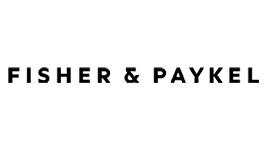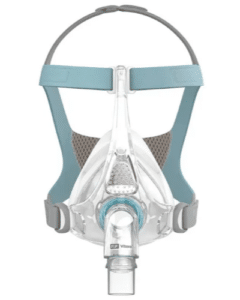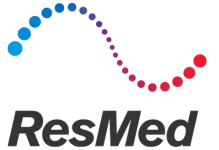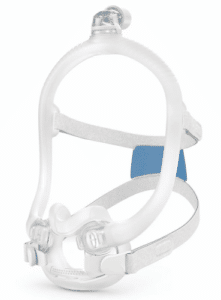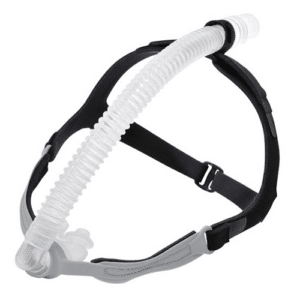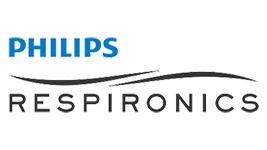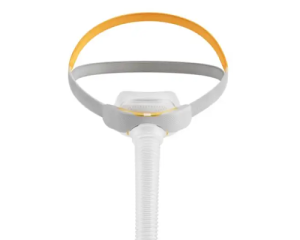- Price: $149
- Sizes: Small and medium-large mask; small, medium, and large face cushion
- Pressure range: 4–30 centimeters of water (cmH20)
- Warranty: 90-day manufacturer warranty
- Standout feature: Multiple headgear and cushion sizes for a more precise fit
Best CPAP Masks of 2025: Reviewed by Experts
Key Takeaways
- Our pick for the best CPAP mask for new users is the Fisher & Paykel Vitera Full Face CPAP Mask because it is easy to adjust to find the right size.
- The CPAP masks on our roundup cost between $75 and $179.
- Insurance and Medicare may cover CPAP masks, and discount programs exist.
- There are three types of CPAP masks in our review: full-face masks, nasal masks, and nasal pillows.
If you’re one of the estimated 33 million adults who use a continuous positive airway pressure (CPAP) machine, you’ll need a CPAP mask. A CPAP mask is a separate purchase from the CPAP device, but it is an essential part of your therapy.
The mask serves as the connection between your CPAP machine and your airways. They are available in nasal, nasal pillow, and full-face cushion styles. Masks also come in different sizes so you can find the most comfortable fit. A mask that doesn’t fit properly isn’t just uncomfortable; it can result in air leaks that interfere with your prescribed pressure settings.
To help you find the best CPAP mask for your needs, we rounded up six of the most popular options in different sizes and costs. You can find them below, along with expert advice on prolonging the lifespan of your CPAP mask. You can also read our review of the best CPAP machines to learn more about the devices we recommend.
Best CPAP masks in 2025
- Fisher & Paykel Vitera Full Face CPAP Mask: Best for New Users
- ResMed AirFit F30i Full Face CPAP Mask: Best for Mouth Breathers
- Fisher & Paykel Opus 360 Nasal Pillow CPAP Mask: Best for Facial Hair
- Philips Respironics DreamWear Silicone Nasal Pillow CPAP Mask: Best for Side Sleepers
- Fisher & Paykel Solo Nasal Mask: Best Nasal Mask
- Resmed F40 Full Face CPAP Mask: Best Full Face Mask
What we look for in a CPAP mask
Based on our research and expert recommendations, we considered several important factors when choosing the best CPAP masks.
Mask style
“As people age, their faces change, so it is important to try out different styles, like full-face, nasal, and nasal pillow masks, to find the most comfortable one for you,” said John Lowe, MD, a physician at Restore Care in Ogden, Utah.
In our Review’s Team testing, we included options from all three popular mask styles to provide a larger selection.
Line of vision
We tried to select masks that minimize obstructions to your line of sight, so you can easily wear the mask while doing things like reading books.
Adjustability
We looked for CPAP masks that offer multiple size options and points of adjustment so you can get a comfortable fit and a good seal. “The mask must provide a proper seal. Otherwise, air leaks may reduce its effectiveness during therapy,” Lowe explained.
Ease of use & cleaning
We chose masks that can be disassembled for easy and thorough cleaning. We also looked for masks that used magnetic attachments, which might be easier than buckles or straps for adults with limited mobility or those with hand or joint pain.
Fisher & Paykel Vitera Full Face CPAP Mask: Best for New Users
Our expert take on the Fisher & Paykel Vitera Full Face CPAP Mask
The Fisher & Paykel Vitera CPAP full face mask comes in small and medium-large headgear sizes with multiple adjustment points to secure it snugly to your head. It also features small, medium, and large cushion sizes to help you get a more exact fit.
We like that this mask is designed to stay in place as you move throughout the night. A stability bar over the mask and nose extends to the forehead so the cushion can adjust as you change positions. The mask is designed to reseal around your face to prevent any air leakage. The cooling fabric also helps to prevent uncomfortable moisture buildup.

Our survey participants on the Fisher & Paykel Vitera Full Face CPAP Mask:
According to our 2023 survey of 600 people who use a CPAP machine, full-face masks were the most popular choice, with 50% of respondents choosing this style.
Who may love it
- People who aren’t sure what size CPAP mask they need
- Hot sleepers who want a CPAP mask with cooling technology
Who may want to avoid it
- People who want a mask that does not cover their nose
Customer reviews
On Sleep Doctor, the Fisher & Paykel Vitera Full Face CPAP Mask has a rating of 4.5 out of 5 stars, with 2 total reviews. On Google Reviews, the mask has a rating of 4.2 out of 5 stars. Many reviewers find the mask comfortable, thanks to the adjustable strap and size options, although some mention that the mask eventually cracked or leaked air.
“I didn’t know what to expect, I heard that these masks were uncomfortable, but after using it since day one, it feels like I’m not wearing anything. It’s so comfortable.”
– Marcos S., verified buyer on Sleep Doctor
“I like the way the headgear attaches to the frame. What I like most though, is how the mask fits to my face. The proof is that it leaves no marks on my face and does not cause the area around my eyes to swell, as has been the case with other masks I have tried. I believe it may be due to the smaller size and fit of the cushion. I actually bought a second Vitera because I liked the fit so much.”
– William G., Google Reviews
ResMed AirFit F30i Full Face CPAP Mask: Best for mouth breathers
Our expert take on the ResMed AirFit F30i Full Face CPAP Mask
As a full-face CPAP mask, this model will support airflow to both the nose and mouth, which is important if you often breathe through your mouth during sleep.
Also, the mask cushion rests underneath the nose instead of across the bridge, which could make it more comfortable than other full-face masks. This means your sight is not blocked, making activities like watching TV, reading, or engaging in bedtime meditation easier.
What’s more, the air tube is attached to the top of the mask and can swivel 360 degrees. This allows you to change positions more easily without the tubing getting in the way. It also has a “quick release” option, allowing you to easily detach the mask from the machine if you have to get up in the middle of the night.
The mask attaches to the frame with magnetic clips so you can quickly disassemble it for cleaning. According to Lowe, magnetic clip designs can be beneficial for adults with arthritis or shaky hands.

Our survey participants on the ResMed AirFit F30i Full Face CPAP Mask
ResMed was one of the most popular CPAP brands in our survey, with around 17% of participants reporting that they chose it for their CPAP machine.
Who may love it
- Combination sleepers who often change positions
- Those who want a mask that’s easy to take apart and clean
Who may want to avoid it
- People with metallic implants or devices, due to the magnets in the mask
Customer reviews
On Sleep Doctor, the ResMed AirFit F30i Full Face CPAP mask has a rating of 5 out of 5 stars, with one review. The reviewer states that he likes the design of including the hose at the top of the head instead of the front. On Google Reviews, the mask has a rating of 4.3 out of 5 stars with 1,291 reviews. Many reviewers say the mask is a good option for people who move in their sleep or sleep on their sides, but some users note that they had trouble finding the right size at first based on the “sizing guide.”
“Love the hose at the top instead of out the front.”
– Stephen, verified buyer on Sleep Doctor
“Very, very good system with excellent comfort and strong tendency to stay put through the night even on this side-sleeper who turns to the other side without awareness. I get great therapy results with this, without the annoyance of a mask over the bridge of my nose or a hose in front of me to tangle with. Comfort on the face is outstanding, hose stays out of the way. Combines the superior comfort of a “nasal pillow” with the dependable pressure delivery of a “full face” mask.”
– Thomas S., Google Reviews
Our ResMed CPAP Machines Review provides more information about the brand and its CPAP equipment.
Fisher & Paykel Opus 360 Nasal Pillow CPAP Mask: Best for facial hair
Our expert take on the Fisher & Paykel Opus 360 Nasal Pillow CPAP Mask
The mask’s nasal cushion curves around the nostrils and base of the nose for a secure seal. It also includes all nasal cushion sizes, so you won’t need to worry about guessing the wrong size.
Besides the mask’s ability to avoid facial hair, we also appreciate its lightweight and minimal design. The tube attaches in front of the nasal mask to help you move around more easily while wearing the mask. You can attach it at the mask’s top or side for security or let it hang freely for more freedom of movement. The wide-set straps also allow you to see more while it’s on.

Our survey participants on the Fisher & Paykel Opus 360 Nasal Pillow CPAP Mask:
Nasal pillows were one of the less popular CPAP mask styles, according to our 2023 survey. Only 8.5% of survey participants reported using them.
Who may love it
- Those who want a less obstructive CPAP mask
- Adults with facial hair looking for a mask that won’t tangle in a mustache or beard
Who may want to avoid it
- People who prefer a full-face mask design
Customer reviews
On RespShop, the Fisher & Paykel Opus 360 Nasal Pillow CPAP mask has a rating of 4.7 out of 5 stars, with 11 total reviews. Many reviewers enjoy the fit of the mask, and some say it’s easy to clean.
“Best nasal mask I’ve owned. I tried for two years to get a mask that would fit and get me through the night. I kept taking other masks off halfway through. Since I got this mask, with the tube on top and more straps to keep it in place, I have found the right mask! I never take it off.”
– Jamie M, verified purchase on RespShop
“These fit extremely well. Just a little bit uncomfortable the first few nights. The nose piece is easily removed for cleaning. The tube mounts to the top of the head strap well.”
– Cory H, verified purchase on RespShop
Philips Respironics DreamWear Silicone Nasal Pillow CPAP Mask: Best for side sleepers
Our expert take on the Philips Respironics DreamWear Silicone Nasal Pillow CPAP Mask
If you sleep on your side, a mask with a bottom attachment may be cumbersome—especially if you lie facing away from your CPAP machine. But this CPAP mask has the tube attached to the top of the frame, allowing you to easily lie on either side without the tube getting in the way, making it a great CPAP mask for side sleepers. The mask also has an open-frame design, which won’t block your sightlines. It features headgear-like attachments to help the mask hug the back of your head for a more secure fit.
The frame comes in three different sizes, and the nasal cushions come in four. The FitPack option on Resp Shop includes all nasal pillow sizes for an extra $10, so you can find your size without pre-measuring. Plus, if you’d like to use a different mask cushion style, like a full-face one, the frame is compatible with other cushion options made by DreamWear.

Our survey participants on the Philips Respironics DreamWear Silicone Nasal Pillow CPAP Mask:
Philips Respironics was the third most popular CPAP brand on our 2023 survey, with nearly 15% choosing the brand for their CPAP machine. Philips DreamStation CPAP devices have been the subject of a 2021 recall, but that recall does not extend to the DreamWear mask line.
Who may love it
- Side or combination sleepers looking for a mask that allows freedom of movement
- Those who want a mask frame that’s compatible with other cushion styles
Who may want to avoid it
- People who dislike the feel of nasal pillows
Customer reviews
The Philips Respironics DreamWear Silicone Nasal Pillow mask has a 5 star review on Sleep Doctor, though this is from only one reviewer. The mask has a rating of 4.2 out of 5 stars on Resp Shop, and 68% of its reviews are 5-star ratings. Positive reviews mention the mask is comfortable and easy to sleep with. Some reviews state that the pillows are too flat, while others said the mask is uncomfortable to wear.
“Lightweight, very comfortable, easy to use.”
– Jay A., verified buyer on Sleep Doctor
“I have long hair, and CPAP headgear slips off the back of my head and moves my headgear and nasal pillows in the middle of the night, causing me to wake up and have to adjust them back into place, resulting in interrupted sleep. The Philips straps on the back and the design of the headgear keep my headgear in place at night.”
– Ruby G., verified buyer on RespShop
Our Philips Respironics Oxygen Machine Review provides more information about the brand and its CPAP equipment.
Fisher & Paykel Solo Nasal Mask: Best nasal mask
Our expert take on the Fisher & Paykel Solo Nasal Mask
The Fisher & Paykel Solo Nasal Mask has cushions available in small, medium, large, and wide sizes. You can also get a fit pack that includes one small, medium, and large size. The mask frame is also compatible with nasal pillows, which is ideal for those who’d prefer a different cushion style.
The headgear consists of a stretchy band that slips on over the head without any straps or buckles. It’s also free of magnets, making it safe for people with metal implants, and we like that the mask sits low on the face, meaning it shouldn’t block your vision.

Our survey participants on the Fisher & Paykel Solo Nasal Mask
Nasal masks, like the Fisher & Paykel Solo Nasal Mask, were the second most popular CPAP mask style according to our 2023 survey. Nearly 24% of participants reported using them as their preferred fit.
Who may love it
- Adults who want a mask frame compatible with nasal masks and nasal pillows
- Those who want a mask that slips on
Who may want to avoid it
- Those who prefer the maneuverability of a top hose attachment
Customer reviews
On Resp Shop, the Fisher and Paykel Solo Nasal CPAP Mask has a rating of 4.6 out of 5 stars, with five total reviews. On Google, the mask has a rating of 3.9 out of 5 stars, with 64 total reviews. While some reviewers enjoy the stretchy design and find that it holds a seal well, others report that it leaks air when moving around or side sleeping.
“Overall, I think this is a great nasal mask. It is very comfortable. The headset strap is easy to adjust and secure the mask to underneath your nose. And the head strap and nasal cushion stay in place while you sleep,”
– Tony F., Google Reviews
“This mask is amazing! It has made a huge difference in my sleep journey. There are times I can barely even tell it’s there.”
– Teressa R., Google Reviews
Resmed F40 Full Face CPAP Mask: Best full face
Our expert take on the Resmed F40 Full Face CPAP Mask
The ResMed AirFit F40 Full Face CPAP Mask features fabric sleeves that cover the headgear frame, so you don’t need to sleep with hard plastic touching your face. The low profile of the mask doesn’t block eyesight, and it’s compatible with glasses if you want to wear your mask during activities like reading.
The headgear detaches with magnetic clips, so there’s no need to adjust buckles, and the tube has a quick-release function for easy removal from the CPAP machine.

Our survey participants on the Resmed F40 Full Face CPAP Mask
In our survey, 60.5% of CPAP users said noise level was the most important feature when purchasing. The Resmed F40 Full Face Mask features a QuietAir vent ring that vents the air you exhale to the side to help prevent the hissing noise that can occur when the air is pointed toward a pillow or mattress.
Who may love it
- People looking for a light and comfortable full face mask
- Users who want a quieter full face mask
Who may want to avoid it
- People with metal implants, since the mask uses magnetic clips
Customer reviews
On Resp Shop, the ResMed AirFit F40 Full Face CPAP Mask has a rating of 2.9 out of 5 stars, with 16 total reviews. On Google, the mask has a higher rating of 4.4 out of 5 stars, with nearly 400 total reviews. Some Google reviewers find the mask more comfortable than other ResMed models and appreciate the lightweight design. But others experienced the mask slipping or breaking the seal during sleep.
“The F40 with its all silicone construction is a lot more comfortable in all sleeping positions. The F40 is a definite evolution in ResMed’s full face mask line. The F40’s cushion is smaller than the F30’s making it even more unobtrusive. The slim hose extension is actually nice, it reduces the pull the CPAP hose exerts on the mask. Overall, it’s my favorite mask right now.”
– Esteban P., Google Reviews
“This is the best full face mask I have ever used. I have been using an F20 AirTouch for years that was causing irritation on the bridge of my nose. With the F40 there is no contact with the nose bridge. F40 is lighter, more adjustable and more comfortable. I have one caveat: The Large Head Gear is almost too large for me at 6 feet 200 pounds. I reordered a Standard Head Gear.”
– Howard H., verified buyer on RespShop
How we test CPAP masks
Our team dedicated over 250 hours to researching CPAP machines, masks, and accessories, including 15 brands and 18 different CPAP masks. This research included comparing the product specifications, features, and performance to determine the best options for different types of sleep apnea. We also used findings from our survey of 600 CPAP users about their experiences with different devices and masks to make our recommendations.
We reviewed each CPAP mask based on:
- Cost
- Type of mask
- Adjustability
- Ease of use and cleaning
- Comfort
- Noise level
- Line of vision
These factors were chosen to reflect the needs and preferences of our audience, especially older adults seeking reliable and comfortable sleep apnea solutions.
By combining expert opinions, comprehensive research, customer feedback, and academic insights, we recommend CPAP masks that can truly benefit our readers. Our goal is to help people make informed decisions about their sleep apnea treatment options, leading to better sleep quality and improved overall health.
We also had all of our selections medically reviewed by an expert in the field to ensure that each brand and model is appropriate for our readers’ needs.
To learn more about our testing, review our CPAP methodology.
What to consider when buying a CPAP mask
- Price: A mask is required for CPAP therapy, but CPAP machines do not include a mask. Mask pricing varies, but we saw mask prices between $50–$300, which significantly adds to the overall cost to set up your CPAP therapy.
- Return policy: Retailers like Respshop have return policies that often give users a 30-day return window, which gives you time to try out the mask and return it for a store credit, if it is opened and used, or full refund, if it is unopened and unused. Check with your CPAP retailer to find out about its return policy before purchasing a mask, especially if you are a new CPAP user.
- Warranty: A manufacturer’s warranty on a CPAP mask protects you in case of material or craftsmanship defects, which can offer peace of mind about your purchase. Warranties may vary in terms and length from manufacturer to manufacturer. Read the warranty carefully to be clear on what exactly is covered and for how long.
- Comfort while sleeping: CPAP therapy must be done consistently to be effective, which makes mask comfort a vital consideration. Finding a mask that accommodates your preferred sleep position and fits your face comfortably and securely can take time. Be prepared to test out different options.
- Adjustability: Mask fit is important for both comfort and function. Masks that include a variety of mask, frame, or nasal pillow size options, as well as those with a variety of adjustment points, can help you find the best fit for your face.
- Tube connection: A tube connection on top of your head may be best if you’re a side sleeper or move around a lot because the tube won’t get in the way. Connecting the tube to the front of your mask may be best if you’re a back sleeper or if you sleep on one side with limited movement throughout the night.
- Seals: A tight seal ensures that air doesn’t leak around the edges of your CPAP mask. The mask’s fit and style will affect how well it seals to your face, making adjustability an important feature in a CPAP mask. Try on different masks to get one with the right seal.
- Line of vision: Some types of CPAP masks, such as full-face and nasal masks or those with oversized forehead straps, can impede your vision when you’re reading or watching television. If line of sight is important for you to consider when shopping for a CPAP mask, look for low-profile models or those with a nasal pillow.
- Ramp time: Most CPAP machines, though not all, are equipped with a ramp feature that makes the onset of oxygen therapy more comfortable. Ramp features moderate the air-flow pressure at the start of oxygen therapy and increase it to the prescribed treatment level over time.
- Replacing masks: The general recommendation is to replace CPAP masks and other equipment as frequently as your insurance will allow, which is typically between three and six months. While the mask itself should ideally be replaced every three months, the cushion or nasal pillows should be replaced more frequently, usually once or twice per month.
- Cleaning masks: Cleaning your CPAP mask regularly helps ensure good hygiene and optimal function. Remember to wash your face before using your mask, and avoid using facial products immediately before going to bed. In the morning, wipe the cushion of your mask with a damp cloth to remove facial oil that may have accumulated in the night.
Learn more about the proper way to clean a CPAP machine in our guide.
What is the best CPAP mask type?
The best CPAP mask type is one that works well with your face size, shape, and sleep style. Comfort is also an important factor, and you may need to try two or three masks before you find one that is most comfortable. Your respiratory therapist should have masks for you to try before you purchase one.
There are three main CPAP mask types: full face masks, nasal masks, and nasal pillow masks. [2]Mayo Clinic. Which CPAP masks are best for you? Found on the internet at https://www.mayoclinic.org/diseases-conditions/sleep-apnea/multimedia/cpap-masks/sls-20076986 The two less common types are oral masks and total face masks.
Full face mask
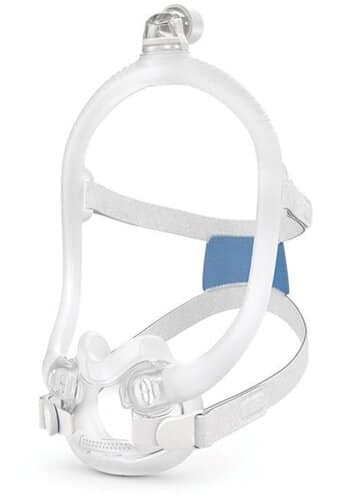
A full face mask covers both your nose and mouth. This type of mask is a good option if you have chronic or frequent nasal congestion or obstruction, which might make breathing through your nose difficult and cause you to breathe through your mouth.
Full face masks deliver air to the mouth in addition to the nostrils, so they’re also a good option for people who tend to breathe through their mouths naturally. This type of mask isn’t a good fit for people with beards, since facial hair can create leaks in the seal. Because of its size, it’s not best for active or stomach sleepers, either.
- Benefits of a full face mask: Air delivery to both the mouth and the nostrils means maximum efficacy, even if you’re prone to congestion; stable and secure
- Best for: Back sleepers
Nasal masks
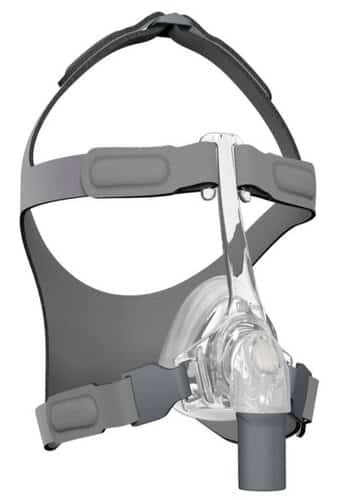
A nasal mask completely covers your nose, but leaves your mouth uncovered. Nasal masks are the most widely tolerated mask style, and you may also prefer a nasal mask if you sleep on your side or stomach. The airflow isn’t as direct as it is with a nasal pillow mask, which may feel more comfortable to some users. You might also choose a nasal mask if you move a lot in your sleep. Nasal masks are smaller, and it’s less likely for your pillow to push the mask out of place if you change sleep positions. Because they don’t provide a mouth seal, they aren’t suitable if you breathe through your mouth or tend to experience nasal congestion. Mustache hair may affect the seal.
- Benefits of a nasal mask: Smaller size may be more comfortable to some users, design works well with a wide range of faces
- Best for: Side, stomach, and combination sleepers
Nasal pillow masks
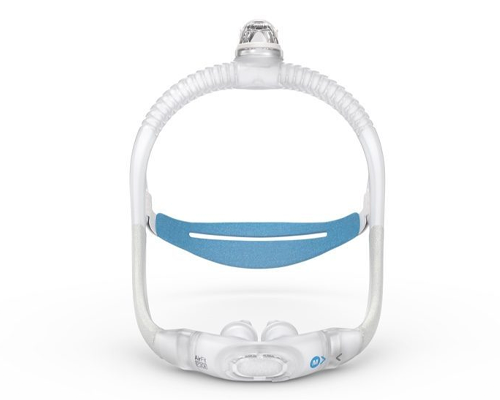
Nasal pillow masks rest underneath your nose, and have “pillows” (plastic, gel, or silicone cushions) that rest in each nostril to deliver air pressure. This mask type offers the least amount of coverage, so it may be a good choice if you are bothered by the feeling of a mask on your face as you sleep. A nasal pillow mask is also the best option if you have facial hair, like a beard or mustache, because the seal is created against the nostrils, instead of anywhere around the face. This type of mask isn’t well suited to people with deviated septums or chronic congestion, or those who breathe through their mouths. The design may not accommodate high-pressure settings well, either.
- Benefits of a nasal pillow mask: Lightweight and unobtrusive, accommodates active sleepers and facial hair
- Best for: Combination and stomach sleepers
Table 1, Most Common CPAP Masks Compared
| Mask type | How it works | Who is it best for? | Cost |
|---|---|---|---|
| Full face | Covers both your nose and mouth | Those with chronic or frequent nasal congestion or obstruction | $100–$250 |
| Nasal | Completely covers your nose but leaves your mouth uncovered | Side or stomach sleepers, as well as those who move a lot while sleeping | $70–$200 |
| Nasal pillow | Rests underneath your nose and has “pillows” (plastic, gel, or silicone cushions) that rest in each nostril | Those bothered by the feeling of a mask on their face, as well as people with facial hair | $80–$150 |
Other types of CPAP masks
Oral masks: Oral masks only cover and deliver air to your mouth. This type of mask is less common than the three main types (full face masks, nasal masks, and nasal pillows) and is ideal if you have consistent nasal blockage and are unable to breathe through your nose. Otherwise, the air that’s going into your mouth would just escape through your nose while you’re sleeping.
Total face masks: Total face masks cover your entire face and go over your nose, mouth, and eyes. This is considered a specialized mask that’s best if you sleep on your back and need even air pressure to your nose and mouth. Similar to a full face mask, it creates a seal around your face to ensure air doesn’t escape when being delivered to your nose and mouth.
Nasal prong masks: Like nasal pillow CPAP masks, nasal prong masks are designed for the nostrils. Instead of sealing the opening of the nostrils, this type of mask uses nasal prongs to create a seal against the walls of the nostrils. It can be a good option for people who find it difficult to get a good seal with other types of masks, including active sleepers or those with facial hair.
Hybrid masks: Hybrid masks combine elements from full face masks and nasal pillow masks. This type of mask is designed to seal beneath your nose and over your mouth so that it can deliver air to both airways. That makes it a good option if you alternate between breathing out of your nose and your mouth. Hybrid masks also tend to be smaller than full face masks, so they may be a little easier for some people to tolerate. They aren’t a good fit for people with facial hair.
CPAP mask components
CPAP masks include various components, with each serving a specific purpose. Here are the most common components:
- Mask headgear: The headgear ensures the mask stays in place on your head. Magnetic clips and Velcro fasteners are often used to allow for a precise fit and easy detachment.
- Mask frame: The mask frame offers structure and includes connection points for the mask’s other components. Generally, mask frames are made with silicone or plastic for flexibility, durability, and ease of cleaning.
- Mask cushion: Cushions and pillows are dual-purpose features that protect the face and create the tight seal necessary to prevent air from leaking out of the mask. Silicone, gel, and foam are often used for comfort.
- Mask hosing/mask hose: The hose is what delivers pressurized air from the CPAP machine to the mask. It’s a flexible component that’s designed to move comfortably as you sleep. Connections points vary depending on the manufacturer and may attach to the front of the mask or the top of the head.
Table 2, CPAP mask components
Mask component | Purpose | Replacement frequency |
|---|---|---|
| Headgear | Keeps the mask fitted to your head | Every six months; more if you’re frequently tightening for a better seal |
| Frame | Provides structure and serves as a point of contact for other components | Every three months; sooner if the frame is showing signs of wear and tear |
| Cushion | Provides comfort and creates the seal that prevents leaking air | Varies depending on manufacturer, but at least every three months |
| Hosing/hose | Connects the CPAP machine to the mask | Varies depending on manufacturer, but at least every three months or sooner if you notice opacity or small tears |
How to get a CPAP mask
To order a CPAP mask, you will first need to complete a sleep study and receive a sleep apnea diagnosis from your doctor. If you’re not thrilled with the idea of taking a sleep test in a medical setting, it’s possible to complete a sleep apnea test at home as long as it is approved by the Food and Drug Administration.
After getting a diagnosis, you will need a prescription to purchase a CPAP machine and mask. The prescription will state that you need CPAP therapy, and it will define your treatment pressure. After being diagnosed with sleep apnea, your doctor will likely perform a second sleep study to help determine what type of mask and pressure level is best suited for your CPAP treatment.
You will need to purchase a mask for your CPAP machine if you are starting CPAP therapy for the first time.
How to pay for a CPAP mask
Besides cash or personal credit cards, there are a few ways you may be able to get coverage, reimbursement, or assistance in paying for a CPAP mask.
Health insurance: Coverage for CPAP equipment varies by insurance plan, but most insurance plans that offer coverage for the device will also offer coverage for the mask and any other required components. Mask coverage often includes a mask replacement schedule, which means after a certain period of time your insurance will cover a new mask to replace your old mask. To maintain insurance coverage for CPAP equipment, most insurance providers will require proof that you are using CPAP therapy nightly as prescribed.
Medicare: Like private insurance, Medicare includes medically prescribed CPAP masks in its CPAP coverage terms because a mask is a necessary component for CPAP therapy. Medicare.gov. Continuous Positive Airway Pressure (CPAP) devices, accessories, & therapy. Found on the internet at https://www.medicare.gov/coverage/continuous-positive-airway-pressure-devices Medicare CPAP coverage starts with a three-month rental, which is considered a trial period. To proceed with coverage after the trial period, Medicare requires confirmation from your doctor that you have used the equipment as prescribed. Medicare will also require confirmation from your doctor that CPAP therapy is helping your condition and that continued CPAP therapy is medically necessary.
Retailer financing: Retailers that offer financing for CPAP devices often extend this option to CPAP masks as well. Oxygen Concentrator Store and the CPAP shop offer financing through Affirm and Bread Pay, third-party financing companies that offer monthly plans for repayment with varying terms and interest rates and are subject to credit approval. Respshop offers in-house financing.
Health savings account (HSA) and flexible spending account (FSA): An HSA is an account for pre-tax money to be set aside for eligible health expenses. An FSA is an employer-maintained account that also acts as a pre-tax savings account for reimbursement of certain health-related expenses. These accounts are slightly different. FSA funds expire each year, and HSA funds have no expiration date. CPAP equipment is considered an eligible purchase for both account types.
CareCredit: CareCredit is a credit card for health care expenses and can only be used at participating retailers. CPAP masks are qualifying purchases with CareCredit.
How to save money on a CPAP mask
If you can’t afford to pay for your ideal CPAP mask, financial assistance programs can lower your overall expenses.
For example, the American Sleep Apnea Association offers a CPAP Mask Assistance program that includes a year’s supply of CPAP masks at a discounted rate. If you qualify, you can get four masks, two tubes, and two filters for $100 per year; you can also purchase a single mask for a $25 fee.
In addition, it has an assistance program that can lower the overall cost of a CPAP machine.
Table 3, Compare the best CPAP masks of 2025
| Prices | $149 | $179 | $115 | $75 | $119 | $155 |
| Sizes | Medium and large frame; Small, medium, and large face cushion | Small, medium, and large | Small, medium, and large pillows | Small, medium, and large frame; Small, medium, medium-wide, and large pillows | Small, medium, large, and wide cushions | Small, medium, and large headgear; Small-wide, medium, and large cushions |
| Pressure range in centimeters of water (cmH20) | 4–30 | 4–30 | 3–25 | 4–30 | 4–20 | 4–30 |
| Warranty | 90 days | 90 days | 90 days | 90 days | 90 days | 90 days |
Bottom line
If you use a CPAP machine to sleep, a mask is an essential part of your treatment. The best CPAP mask for your needs depends on factors like your preferred cushion style and sleeping position, and it’s perfectly normal to try out multiple masks until you find the one that feels right.
The Fisher & Paykel Vitera CPAP Full Face Mask is our top pick for new users since the Fitpack option includes multiple cushion sizes to try out. The right mask for you will vary based on your CPAP treatment needs and comfort preferences.

Frequently asked questions
The CPAP mask that works best for you depends on your face shape, sleep position, movement during sleep, and your sleep study results. The sleep study will determine whether CPAP is most effectively delivered for you through your nose, mouth, or both.
Snoring is often a symptom of sleep apnea, and all CPAP machines and masks are designed to treat sleep apnea, which may reduce snoring. The mask that most effectively treats your snoring will be the one that works best for your individual CPAP therapy needs.
CPAP masks and machines are designed to treat sleep apnea by delivering continuous pressure to keep airways open.
The cost of a CPAP mask can range from about $50 to more than $300, depending on the mask model you select.
Yes, you will need a prescription in order to purchase a CPAP mask and device.
The most comfortable CPAP mask varies from one person to the next and largely comes down to personal preference. Accounting for your face shape and size, as well as your preferred sleep style, can help you find a comfortable mask. Be prepared to try two or three masks before finding one that fits comfortably.
You should usually replace masks every three months, but replacement will depend on how often you use it and how thoroughly you clean it. Washing a CPAP mask with mild soap and water daily to reduce the risk of skin irritation helps prolong the life of the mask components.
Have questions about this review? Email us at reviewsteam@ncoa.org.
Sources
- Philips. Voluntary Recall Information. Found on the internet at https://www.usa.philips.com/healthcare/e/sleep/communications/src-update
- American Academy of Sleep Medicine. Does Insurance Cover My CPAP Machine? Found on the internet at https://sleepeducation.org/does-insurance-cover-my-cpap-machine/
- Medicare.gov. Continuous Positive Airway Pressure (CPAP) Devices, Accessories, & Therapy. Found on the internet at https://www.medicare.gov/coverage/continuous-positive-airway-pressure-devices
- Healthcare.gov. Health Savings Account (HSA). Found on the internet at https://www.healthcare.gov/glossary/health-savings-account-hsa/
- Healthcare.gov. Using a Flexible Spending Account (FSA). Found on the internet at https://www.healthcare.gov/have-job-based-coverage/flexible-spending-accounts/
- American Sleep Apnea Association. CPAP Assistance Program. Found on the internet at https://www.sleephealth.org/asaa/cap-program/
- NCOA CPAP Survey. 600 respondents. Conducted using Pollfish. Launched July 25, 2023.

